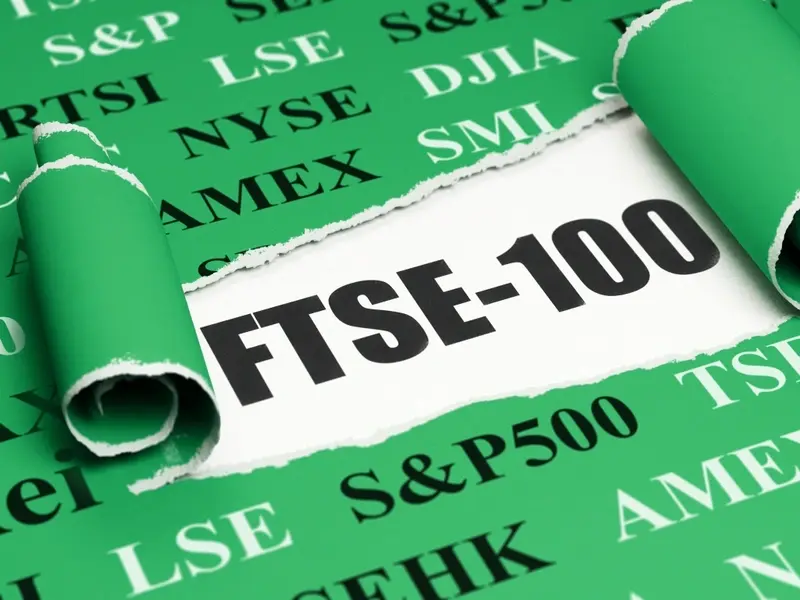
- Energy stocks win while consumer and housing stocks suffer
- Index finishes barely changed from 2021
- Earnings and dividends give reasons for optimism in 2023
Despite a year which has seen armed conflict in Europe for the first time since 1945, and a concerted campaign by central banks around the world to raise interest rates to choke off inflation, the FTSE 100 index has somehow ended 2022 almost exactly where it started.
As of this morning the index stood at 7,478 points, 93 points or 1.2% above where it closed on 31 December 2021.
| FTSE 100 returns 2010 to 2022 | ||
| Year | Close | Change |
| 2010 | 5,890 | 9.0% |
| 2011 | 5,572 | -5.6% |
| 2012 | 5,898 | 5.8% |
| 2013 | 6,749 | 14.4% |
| 2014 | 6,566 | -2.7% |
| 2015 | 6,242 | -4.9% |
| 2016 | 7,143 | 14.4% |
| 2017 | 7,688 | 7.6% |
| 2018 | 6,728 | -12.5% |
| 2019 | 7,542 | 12.1% |
| 2020 | 6,461 | -14.3% |
| 2021 | 7,385 | 14.3% |
| 2022 | 7,478 | 1.2% |
WINNERS AND LOSERS
The war in Ukraine sent global energy prices soaring, so it is no surprise to see oil and gas producers such as BP (BP.A) and Shell (SHEL) on the list of big winners alongside energy trading firm Glencore (GLEN).
Similarly, BAe Systems (BA.) benefitted from a surge in defence spending as countries reassessed their physical security in the wake of Russia’s invasion of its neighbour and rising geopolitical tensions generally.
One of the more unexpected winners was educational publishing group Pearson (PSON), which as well as confounding its critics by turning in a better-than-expected operating performance found itself being pursued by US private equity firm Apollo.
Meanwhile, rising interest rates, the withdrawal of many mortgage products and the cost-of-living crisis sent shares in house builders plummeting with Barratt Developments (BDEV) and Persimmon (PSN) the worst affected.
Rising interest rates also hammered shares in industrial and logistics property company Segro (SGRO), which enjoyed a 40% uplift in net asset value last year only to see real estate valuations slashed this year.
At the same time, the squeeze on household spending and the normalization of shopping habits two years on from the pandemic sank shares in online grocery delivery group Ocado (OCDO), which found itself at the very bottom of the pile in terms of performance.
Lastly, the dramatic slide in valuations of US technology and biotech companies sent shares in the UK’s largest listed investment trust, Scottish Mortgage (SMT), down 46% for their worst year since the financial crisis.
| Best and worst FTSE 100 performers in 2022 | ||
| Stock | Market Cap | Perf YTD |
| BAE Systems | £26.4bn | 55.6% |
| Pearson | £6.7bn | 53.7% |
| Glencore | £71.4bn | 48.5% |
| Beazley | £4.5bn | 45.5% |
| Shell | £165bn | 45.2% |
| Barratt Developments | £4.1bn | -45.7% |
| Scottish Mortgage Inv Trust | £10.2bn | -46.0% |
| Segro | £9.2bn | -47.1% |
| Persimmon | £4.0bn | -56.7% |
| Ocado Group | £5.2bn | -62.2% |
| Source: Sharepad, Shares magazine | ||
| Data correct as of 23 December, 2022 | ||
WHAT CAN WE EXPECT IN 2023?
‘The FTSE 100 stands barely 5% below its all-time high and it is possible to make the case for the UK’s premier stock market benchmark setting new peaks in 2023, despite the doom and gloom which prevail in the wake of Trussonomics, a sequence of interest rate increases and Russia’s invasion of Ukraine’, says AJ Bell investment director Russ Mould.
He adds: ‘Take those into account and the FTSE 100’s performance looks quite resilient and, if anything, the best argument is favour of investing in UK equities is the air of pessimism which surrounds them.’
As Mould points out, pre-tax earnings for the index are still expected to rise next year and dividends are expected to reach an all-time high in value terms.
‘All other things being equal, even a 10-12% advance in the FTSE 100 to 8,250 would leave the index on a price to earnings ratio of 12 and a yield of 3.8%, neither of which looks demanding’, concludes Mould.
The Economy Forecast Agency, which uses statistical models based on historic data to predict the future value of everything from stock markets to crude prices and cryptocurrencies, sees the FTSE 100 index closing next year at 7,722 points, with a minimum target of 7,259 points and a maximum of 8,185 points.
That would imply just 3% downside from today’s level in a worst-case scenario and close to 10% upside in a best-case scenario, suggesting a positive risk-reward trade-off.
Disclaimer: The author owns shares in Scottish Mortgage Investment Trust




